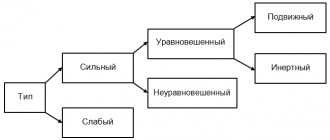Since ancient times, a connection between temperament and physiology has been observed. The father of medicine, Hippocrates, who lived in the 5th century BC, identified four types of temperament. In his opinion, they were determined by one or another liquid prevailing in the human body. For sanguine people it is blood, for choleric people it is bile, for phlegmatic people it is mucus, and for melancholic people it is black bile. That is, temperaments were viewed as exclusively physiological phenomena. What changes in their understanding have occurred since then? - This is what we will talk about. ...
What is temperament
Temperament - in psychology, is an individual characteristic of a person, which largely depends on his innate, psychophysiological qualities. Temperament is a strictly individual trait based on mental activity, speed and intensity of psychophysiological processes.
This is interesting: ambitious and ambition - what do these terms mean?
There are three areas in which temperament manifests itself:
- The degree of human activity in a general sense.
- Differences in the area of movement.
- The degree of external expression of feelings.
General activity is characterized by the intensity with which a person interacts with the surrounding natural or social environment. There are two extremes here: some people are too sluggish and passive, while others are very fast and active.
Motor activity (motility) is expressed in how fast and sharp movements and speech are or, conversely, how slow they are and the person is silent.
Expression of feelings, or emotionality , is manifested in how quickly the emotional state changes, susceptibility to external influences, to the feelings of another person.
This is interesting: what stages does a personality go through in the process of formation?
Types of temperament
At the beginning of the 18th century, the types of temperament described by Hippocrates were compared with four psychotypes, which served as the beginning of the psychological direction in the study of temperaments. Today, the simple ideas of ancient people are practically no different from those in the 18th century.
- The choleric type is defined as irritable.
- The sanguine type is associated with cheerfulness.
- The phlegmatic type is defined as calm.
- The melancholic type is associated with sadness and excessive impressionability.
In modern psychology, temperament is described as stable and established natural personality qualities that determine the speed of mental activity, regardless of its internal content.
This is interesting: what is degradation?
Extroverts and introverts
The qualities of temperament include introversion and extraversion, the pace of reactions, rigidity (inflexibility) and plasticity.
Extraversion and introversion are qualities of temperament that were introduced as concepts by Swiss psychiatrist Carl Gustav Jung.
- An extrovert focuses on his own manifestation in the world around him, that is, on external impressions that arose in a given period of time. These include choleric and sanguine.
- An introvert - on his inner world, psychological state, that is, the internal reality is more important for him than the external one. These are phlegmatic and melancholic.
Reaction speed, rigidity, plasticity
The speed of reactions is a characteristic of the pace at which mental processes and the body’s response occur. These include quickness of mind, speech and gestures. The speed of reactions is high in people who are sanguine and choleric, as well as in melancholic people - if they are well rested. In melancholic people who are tired and phlegmatic people it is lowered.
Sometimes this causes problems in communication between people with different temperaments. People with quick reactions do not always notice that people who are more inhibited do not have the opportunity to follow the course of their thoughts. Because of this, they come to unfounded conclusions that the latter have low mental abilities. This can especially interfere with business relationships.
Rigidity and plasticity . The first quality indicates that a person has difficulty adapting to external influences, while the second, on the contrary, indicates good adaptation. Sanguine people have the highest plasticity. Rigidity is characteristic of melancholic, phlegmatic and choleric people.
Temperament and character of a person
The concept of “temperament” is often identified with character
.
But whichever psychologist’s classification you consider, this is a wrong point of view. Of course, there is a relationship between character and temperament, but these concepts do not mean the same thing. Thus, temperament is given to a person by nature and throughout life, if it changes, it is insignificant, but character is formed and transformed all the time. People with the same temperament can have completely different characters, which is due to the influence of society, upbringing, profession, interests, hobbies. And imagine how similar all people would be if we all had only 4 character types with minor differences.
Inactivity and activity
Inactivity is an indicator of an involuntary reaction to stimuli, both external and internal. It represents a defensive reaction to criticism, insult, or raised tone. Inactivity is characteristic of phlegmatic and melancholic people and rare for choleric and sanguine people.
Activity is the opposite of inactivity; it is a characteristic of a person’s ability to overcome obstacles and achieve goals.
Its expressions are:
- focus;
- persistence;
- high concentration of attention.
A phlegmatic person is highly active, but since he has low reactivity, his inclusion in work occurs slowly. A phlegmatic person does not overwork. Choleric exhibits high activity in combination with reactivity. Sanguine people are also quite active, but they may lose interest in monotonous activities. Melancholic people are characterized by low activity.
His activity largely depends on how activity and reactivity are correlated in a person. From random circumstances, external or internal (mood, unplanned, insignificant events) or from goal setting, strong desires, conviction of something.
Summary
As noted above, none of the temperament types are either bad or good. In addition, a person cannot belong to only one single type - he can only have a predominant one, and the rest will be complementary. But, be that as it may, from the perspective of psychological science, types of temperament are only one of the ways of psychological assessment of a personality. You should also be aware that descriptions of temperaments may differ from one specialist to another and include many factors.
Emotional excitability
It is a reflection of the line of minimal impact beyond which an emotional reaction occurs, as well as the speed of its development.
Sanguine people, melancholic people and choleric people are characterized by increased excitability. In phlegmatic people it is reduced. The characteristics of temperament inherent in an individual are determined by the unique combination of activity and the severity of emotional reactions to varying degrees. Activity is determined by how intensely a person interacts with the environment.
Today, the scientific community remains confident that the considered properties of human behavior are based on physiology. That is, they are determined by certain features in the functioning of physiological structures. But what kind of structures these are is not yet clear. However, what is indisputable is that temperament is an innate property that serves as the basis for most personality traits, which include character. And the sensual basis of character is temperament.
Character advantages
A melancholic person, the pros and cons of which are described in the article, is for the most part considered a depressive type who does not have any positive qualities, with the exception of responsiveness and kindness. Many people associate melancholy with some kind of sadness, dullness and hopelessness. However, in addition to the fact that melancholic people are actually very sympathetic and kind, they also have a number of other advantages that people with other types of temperament cannot boast of.
Melancholic people are wonderful creators and thinkers
The German writer Franz Kafka was a famous melancholic person. In his work, melancholy is fully reflected, since in his works he very often touches on themes of absurdity and doom.
Melancholic people also include:
- Ch. Darwin;
- P. Tchaikovsky;
- N. Gogol.
Indeed, the predominant melancholy in the character contributes to the development of the desire for solitude and active mental activity. Melancholic people make excellent artists, writers, musicians, and actors, since they can, thanks to their sensitivity, accurately enter into an image and recreate it as emotionally and truthfully as possible.
If a melancholic person has no creative inclinations, then he can manifest himself in monotonous work that requires perseverance and concentration (accountant, programmer).
Melancholic people can be happy
It is believed that melancholic people are more likely than others to feel like unhappy people and tend to complain about fate. There is some truth in this, but this fact does not mean that they cannot be happy.
What makes melancholic people feel unhappy is their lack of fulfillment in one or even several areas, because due to shyness, timidity and touchiness, it is sometimes very difficult for them to build both their personal life and achieve professional recognition. If a melancholic person is aware of his problems and works on himself, then he has every chance to live fully and happily.
Tendency to self-reflection
Self-reflection and introvertism (withdrawal) of melancholic people can be both a plus and a minus. The positive thing is that such people tend to conduct a deep analysis of their thoughts, actions and the events that happen to them, which helps them develop internally and improve.
On the other hand, such soul-searching should not completely master a person, since otherwise he will quickly lose interest in everything in the world except himself, which will significantly limit his growth and development in all areas of life.
Psychologist skills
The habit of conducting a deep mental analysis of various events over time helps melancholic people learn to understand people no worse than certified psychologists. Often, melancholic individuals keep diaries, where they lay out in detail all their experiences. The experience accumulated over the years allows them to separate the bad from the good and intuitively accurately predict the course of events.
Deep Mind
Melancholic people have a deep and inquisitive mind. If they are interested in a question, they will definitely get to the bottom of it. They see no point in studying and delving into something superficially. The downside of this trait is that they do not tend to study everything at once and therefore it may seem that their range of interests is rather narrow.
But this is not entirely true. They may have many interests, but due to the characteristics of their melancholic temperament, they prefer not to be scattered about everything, like, for example, choleric people, but to really deeply study one area or realize themselves in some specific narrow area (creativity, motherhood, scientific Job).
Restraint
Melancholic people know how to remain silent when necessary, since they are very tactful and subtly feel when it is appropriate to speak out and when it is better to refrain from doing so. When talking with other people, they never interrupt and know how to listen.
Cons of temperament
A melancholic person, whose character advantages are discussed in general terms, also has negative sides or disadvantages that may not have the best effect on his own life.
Bad organizers
Melancholic people are good performers when it comes to routine work (programmers, accountants), and they also perfectly reveal their inner world in creativity if they have some inclinations. At the same time, activities that require pressure and suppression of the will of other people are not suitable for them. It will be difficult for them where they regularly have to experience stress, face rudeness and refusals (sales, business).
Melancholic people rarely become the life of the party and informal leaders in everyday life, since, in general, they are not particularly eager to learn how to win the attention of other people, simply because they do not need it.
Vulnerability and touchiness
Melancholic people are extremely touchy and vulnerable people. They often attach importance to things that a person with a different type of temperament would not even notice. Being offended, melancholic individuals accumulate negativity within themselves for years, since they remember very well the misdeeds of other people and often mentally constantly return to one or another painful situation for them.
This perception of life, first of all, harms them themselves, since, stuck in the past and fixated on it, they give a significant part of their energy to meaningless reasoning, which negatively affects their desire to learn something new and move forward.
Pessimism
Melancholic people are those people who do not expect anything good from life and are pessimistic about any endeavors and initiatives. This may include sarcastic comments and ridicule, as well as the panic they may feel under certain circumstances. Such life attitudes only intensify over the years, which is associated with the accumulated experience and grievances of the melancholic person.
Melancholic. Advantages and disadvantages
Knowing this characteristic of a person, many try to avoid communicating with him, since most people do not like to listen to gloomy forecasts about their ideas if they share their plans and want to achieve something.
Slowness
Not only phlegmatic people, but also melancholic people have this trait. It is difficult to expect a quick solution from them, and if you try to put pressure on a melancholic person, you can make an enemy who will be sure all his life that he made a mistake precisely because of this haste.
When solving both current and global issues, melancholic people prefer to approach the matter thoroughly and seriously, having thoroughly considered all the arguments and weighed all the pros and cons, which in itself requires a considerable amount of time.
Need for approval
A melancholic person is very motivated by the high appreciation of his activities. It is important for him to know that his efforts did not go unnoticed, and that he is not doing something in vain. Otherwise, such people may become offended; they will feel that they are not valued and that no one needs their efforts. As a result, melancholic people very quickly lose motivation, become offended and may even become depressed.
Tendency to depression and mental illness
It is not at all necessary that every melancholic person will necessarily encounter depression in his life, however, psychologists and psychiatrists have every reason to believe that this type is more prone to developing various kinds of mental illnesses. Often these diseases occur unnoticed by others (especially depression), which ultimately can lead to the irreparable - a complete loss of interest in life, suicide.
Perfectionism
Another striking feature of the melancholic character type is perfectionism or the desire to do everything perfectly and demanding the same from others. Such people tend to set high demands on others and themselves.
The fact that people in most cases do not live up to his expectations and hopes greatly upsets the melancholic, but what upsets him even more is the fact that he himself does not always comply with the rules and regulations he has invented and thereby, in his opinion, lets others down. As a result, the already low self-esteem of the melancholic person falls even further and he begins to be tormented by a painful feeling of guilt and shame because of his own imperfection.
Phlegmatic and melancholic
A phlegmatic person is a person who is unhurried, indifferent to many things, has a stable sense of purpose and mood, and outwardly shows his emotions with extreme restraint. In his work, he shows persistence and firmness while remaining calm and diligent.
A melancholic person is a personality type characterized by a vulnerable psyche; he experiences different events all the time. It is difficult for a person with such a temperament to keep his experiences inside; he is very impressionable and does not have sufficient willpower to cope with feelings.
Note to the manager
Knowing the essence of the matter at least in general terms, a sanguine person can brilliantly conduct a conversation with anyone. As you know, sanguine people are good speakers. Therefore, they should be given the floor more often at various meetings and conferences. However, technical issues in work often cause difficulties for sanguine people. You shouldn’t trust them with monotonous, conveyor-type work that requires constant attention.
Phlegmatic colleague
The phlegmatic person is unhurried and thorough, possesses enviable equanimity and composure. This is a peace-loving and restrained person who is difficult to anger. He does not like innovation and is generally quite conservative.
A phlegmatic person is not inclined to be a leader: he can work both in a team and independently. He has smooth and friendly relationships with colleagues and easily adapts to the mood and atmosphere of the team. It is calm and pleasant to communicate with phlegmatic people, because it is known in advance that the interlocutor will not flare up without a good reason, and will not start shouting if he does not like something in the statements. The dialogue will always be constructive, objections will be logical and reasoned.
Communicating with phlegmatic people can be difficult because it is difficult to recognize their emotional reaction to everything that others do and say. One can only guess how this person perceived something, and whether he was offended. Also, phlegmatic people can easily gain fame as bores - they like to tell something in detail and in too much detail, so sometimes it becomes boring in their company.
Advice to colleagues: To achieve his respect, you need to share his values - work conscientiously, not commit rash actions, and especially not force him to participate in them! A phlegmatic person will like it if you come to him for advice, and then listen with interest and without objections.
Choleric and sanguine
A choleric person is a sharp, fast and impetuous type, while he is extremely unbalanced, with lightning-fast changes in mood and emotional outbursts. A choleric person does not have balance in his nervous processes, which distinguishes him from a sanguine person. People with this temperament recklessly waste their emotional strength and become exhausted.
A sanguine person is a lively, bright, very active person, with a high frequency of changes in mood and impressionability, with a high-speed reaction to any events occurring in the world around him. A sanguine person very easily comes to terms with any failures and problems. As a rule, he is distinguished by lively facial expressions and is successful in his activities. This happens when he is interested in a process that makes him very excited. If the work is not of particular interest to him, then the sanguine person becomes indifferent and begins to get bored.
Each type of temperament includes both positive and negative traits. A person can be protected from the excessive manifestation of negative properties inherent in nature by his upbringing and kind attitude towards other people.
Note to the manager
A phlegmatic person works well in conditions of monotony and monotony, where endurance, patience and perseverance are needed. Usually he switches slowly from one job to another, so if he has already taken on one task, he will see it through to the end. He needs to give instructions accurately and concisely, preferably in writing, so that he can think about and analyze the new information. Under no circumstances should you entrust a person of this type of temperament with a job that requires initiative or prolonged communication with people! Working with clients is simply contraindicated for them.
Choleric colleague
A choleric person is a very impulsive and lively person who reacts emotionally to everything that happens. He is passionate about his work, can overcome significant difficulties and never gives up. If something fails to be done the first time, the choleric person will solve the problem again and again until he brings the matter to a victorious conclusion. He must always win - this is his main rule.
Choleric loves various changes, and, oddly enough, both positive and not so positive. The increased emotionality of choleric people leads to the fact that all their thoughts are literally “written on their faces” - you can easily determine when a choleric person is interested, when he is bored or irritated.
By nature, choleric people are sociable and easily make contact.
They like to subjugate and control those around them; they see everyone as rivals. Excessive straightforwardness, hot temper, harshness and intolerance sometimes make it difficult for a choleric person to stay in a team: he cannot always stop in time, which offends others, without meaning to. The choleric person actively gets down to work, plans a lot, but quickly burns out and becomes not only useless, but also negatively inclined towards the task, which can cause bewilderment and dissatisfaction among colleagues. Advice to colleagues: If you work with a choleric person, do not react to his outbursts and do not try to shout down, do not argue. Put an interested smile on your face, speak in a friendly tone, you can even make an inoffensive joke. Show confidence. This will puzzle the choleric and at the same time calm him down.
Temperament of a sanguine person according to Pavlov
Physiologist Pavlov, in his description of the distinctive features of a sanguine person’s temperament, says that he is a productive worker, an enthusiast, but only when he has a lot of interesting things to do that cause constant excitement. In the absence of such things, he is lethargic and boring. A sanguine person easily adapts to changing life situations. He has a sociable character that allows him to communicate well with a large number of people. His feelings arise with ease and speed, replacing each other.
His stereotypes are not established, and conditioned reflexes are developed at high speed. In an unfamiliar environment, he does not feel constrained and can quickly switch attention and change types of activities. A sanguine person is stable in his feelings. People with this temperament are especially suitable for activities that require great effort, high speed of reactions, and distribution of attention between several objects.
Temperament of a choleric person
According to Pavlov, a choleric person is a combative person , on the rise, he is prone to rapid irritability.
When he gets carried away with something, he uses his strength to the maximum and ends up feeling very exhausted or even exhausted. Choleric people are characterized by high emotional reactivity and motor sharpness. In an unfavorable situation, the increased level of excitability characteristic of people of choleric temperament can play a cruel joke on them. They can flare up over a trifle, becoming aggressive.
When a choleric person has the necessary motivation, he can overcome great difficulties by passionately devoting himself to his work. His mood changes dramatically. A choleric person achieves the greatest results in a situation in which high reactivity and immediate tension are required.
What to do for a melancholic person: top 10 professions
The easiest way for melancholic people to realize their potential is in areas where they do not need to constantly be in contact with people or where communication with them is not active and imposing, such as in sales, the service sector, and management. Most of all, melancholic people like leisurely, measured work that requires concentration on the little things. Also, such people can realize themselves in some creative professions if they have the necessary natural inclinations.
Top 10 professions in which a melancholic person has a better chance of realizing and expressing himself:
- Scientist.
- Teacher (teacher).
- Accountant, economist, financier.
- Educator.
- Programmer.
- Architect.
- Designer.
- Singer, musician.
- Artist.
- Jeweler.
Phlegmatic temperament
A phlegmatic person always behaves evenly, calmly, he is a hard worker, persistent and persistent. This is how I.P. Pavlov described him . The reactions of a phlegmatic person are characterized by slowness and stability of mood. He expresses his feelings little, and in difficult situations he is calm and self-possessed. There are no impulsive and impetuous movements, since in his nervous system excitation is balanced by inhibition.
A phlegmatic person has the ability to correctly calculate forces, is persistent and gets things done to the end. It is not easy for him to switch attention and switch to another type of activity. He has stable stereotypes, and his behavior is not flexible. A person with a phlegmatic temperament can be successful in those areas of activity in which it is necessary to distribute forces evenly, have perseverance, great patience, and the ability to concentrate.
Mixed types of temperament: description, characteristics
Pure psychotypes are very rare. Usually these are various variations of two or more temperaments.
Mixed temperaments:
- Phlegmatic/sanguine. Active, but not in a hurry, have a lot of friends, like to be in company, but not attract much attention. Stress-resistant, efficient. They can speak beautifully, but also remain silent when necessary.
- Melancholic/phlegmatic. Reserved, scrupulous and pessimistic. They are often depressed, but quickly get out of it. They love to do one thing and see it through to the end.
- Sanguine/choleric/phlegmatic. Balanced and very active psychotype. They always attract attention and achieve success in business. They get along well with people, but dominate when necessary.
- Choleric/sanguine. Strong, caring, able to communicate with people. These are always leaders and individuals prone to dominance. Active and purposeful.
- Choleric / sanguine / melancholic. Active and purposeful, but at the same time ready to make concessions. They perform well in front of an audience and can lead.
- Phlegmatic/choleric . They finish what they started. They love stability and always stand their ground. They try to dominate, although they don’t always succeed.
- Sanguine/melancholic. Persuasive, critical and persistent. They are trying to turn the situation in their favor. True friends, picky, do not like to speak in public.
- Melancholic / sanguine / phlegmatic. They do everything according to the rules, are not aggressive, caring and secretive. Kind to people and sensitive. Good friends and helpers.
- Melancholic / phlegmatic / choleric. Stable, cautious and persistent. Caring and positive. Too critical and demanding.
Mixed types of temperament: description, characteristics
Melancholic temperament
According to Pavlov, the melancholic temperament is a type of nervous system that is inhibitory. A melancholic person does not trust anyone, does not have any hopes, sees the bad and dangerous in everything. He is distinguished by increased vulnerability and a tendency to experience strong emotions, sometimes out of nowhere. His feelings quickly manifest themselves, he cannot restrain them, so they are always noticeable to others. The activities of a melancholic person are often hampered by strong external influences.
He is a pronounced introvert, closed in on his own experiences, avoids contact with strangers and changes in environment. He is prone to indecision, shyness, is timid, and sometimes cowardly. If a melancholic person is in a familiar , favorable environment, then he is able to achieve good results in activities that require high sensitivity, observation, reactivity, and good learning ability.
In conclusion, it should be noted that there are no people who have one or another temperament in its pure form. But the general trend, as a rule, is visible. According to researchers, a person's character can change throughout life, but temperament never does. Melancholic, sanguine, choleric, you can find out by following the link.
Phlegmatic - his personality characteristics
- A phlegmatic person has a very strong and inert nervous system (it is difficult to unbalance him). Such people are able to engage in monotonous activities for a long time without getting tired at all. Such a person gets stuck on something and it is quite difficult for him to switch.
- The nervous system of a phlegmatic person is quite slow, so from the outside he may look slightly inhibited both in actions and in perception. For example, such people gesture little, move slowly, and are not particularly dexterous or fast. They seem to be slow to get anything. It is especially difficult for phlegmatic people to react quickly when something is conveyed on an emotional level.
- A phlegmatic person is a pronounced introvert (for him, internal representation is more important than external stimuli). Although, unlike a melancholic person, for whom his emotional processes are more important, for a phlegmatic person his thoughts are more important.
- Due to the predominance of inhibition processes in mental activity, it is very easy for such people to stop their internal impulses and restrain their emotions (they have a strong “ego”). But they tend to accumulate affect. That is, the phlegmatic person will restrain himself the first time, the second time too, but the third time he can throw out all his accumulated aggression at once and no one will find it enough.
- Phlegmatic people are quite socially adapted. Problems can arise only in understanding the feelings (and subtexts) of other people, and your own feelings too. However, in real life it doesn't look so scary.
- Also, phlegmatic people quite easily and naturally support social attitudes, although they reach them more slowly (they may follow a slightly outdated fashion).
- Due to the predominance of inhibition in the emotional sphere, such people are very rational and make decisions only on the basis of logic (without any impulsiveness).
- Individual and monotonous work is well suited for phlegmatic people. They make excellent programmers, financiers, scientists, engineers, and the like. In general, people with this temperament are excellent hard workers.
- There are many phlegmatic people in science, although if we talk about true genius, then this is more likely to be melancholic. Such people have low learning ability, that is, they take a long time to grasp certain skills, but if they have already learned something, they will never forget it.
- The phlegmatic also gets along with people rather slowly, and at the same time, the relationship still remains rather superficial due to the lack of emotional overtones.
- But nevertheless, such people are still capable of long-term relationships due to the fact that it is simply difficult for them to switch to another person (they get stuck). Although, after breaking up with you, a phlegmatic person will not be so upset due to the extremely low emotional component and tendency towards introversion (loneliness).
- Phlegmatic people get along well with melancholic and sanguine people, but they will have trouble with choleric people.
- A phlegmatic person completely lacks leadership qualities. He is not interested in people and is unable to engage them emotionally. In any couples, whether with a melancholic or a sanguine person, he will be more likely to be a follower.
- Phlegmatic people do not react to conflict in any way. That is, they do not show any emotion when aggression is directed towards them. And in order to bring this type of people to assault, you have to try very hard. But in this case, the release of anger can be colossal.










